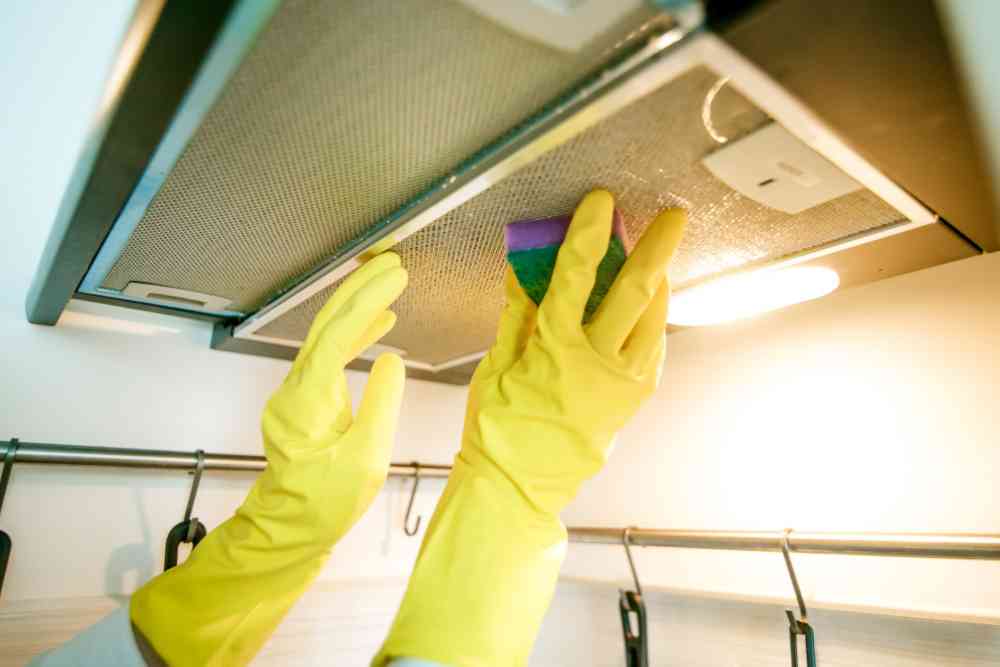Home Cleaning Kitchen Exhaust

Keeping your kitchen clean is essential for maintaining a healthy and hygienic living environment. One area that often gets overlooked is the kitchen exhaust system. A dirty kitchen exhaust can lead to a range of problems, including poor air quality, increased fire risk, and reduced efficiency of your ventilation system. In this article, we will explore the importance of cleaning your kitchen exhaust and provide valuable insights on how to effectively clean and maintain it.
Ontario-wide Kitchen Exhaust and Hood Cleaning – Best prices and service guaranteed.
The Importance of Cleaning Kitchen Exhaust
A kitchen exhaust system plays a crucial role in removing smoke, grease, and odors from your kitchen. Over time, these particles accumulate in the exhaust system, forming a thick layer of grease. This buildup not only affects the performance of the system but also poses serious health and safety risks.
Here are some key reasons why cleaning your kitchen exhaust is important:
- Improved Air Quality: A dirty kitchen exhaust can release harmful pollutants into the air, including carbon monoxide and volatile organic compounds (VOCs). These pollutants can cause respiratory problems and other health issues.
- Reduced Fire Risk: Grease buildup in the exhaust system is highly flammable. If a fire starts in your kitchen, the grease can quickly ignite and spread throughout the ductwork, leading to a dangerous situation. Regular cleaning of the kitchen exhaust reduces the risk of fire.
- Enhanced Efficiency: A clean kitchen exhaust system operates more efficiently, allowing it to effectively remove smoke, steam, and odors from your kitchen. This improves the overall ventilation and keeps your kitchen fresh and comfortable.
- Compliance with Regulations: Many local health and safety regulations require regular cleaning and maintenance of kitchen exhaust systems. Failure to comply with these regulations can result in fines and penalties.
Ontario-wide Kitchen Exhaust and Hood Cleaning – Best prices and service guaranteed.
Effective Cleaning Techniques
Now that we understand the importance of cleaning the kitchen exhaust, let’s explore some effective techniques to ensure a thorough and efficient cleaning process.
1. Safety Precautions
Before starting the cleaning process, it is crucial to take proper safety precautions:
- Turn off the exhaust system and disconnect the power source to avoid any accidents.
- Wear protective clothing, including gloves, goggles, and a mask, to protect yourself from grease and other harmful substances.
- Place drop cloths or plastic sheets to protect your kitchen surfaces from any drips or spills.
Ontario-wide Kitchen Exhaust and Hood Cleaning – Best prices and service guaranteed.
2. Remove and Clean Filters
The first step in cleaning the kitchen exhaust is to remove and clean the filters. Grease filters are designed to trap grease particles and prevent them from entering the ductwork. Over time, these filters become clogged with grease and need to be cleaned or replaced.
To clean the filters:
- Remove the filters from the exhaust hood.
- Soak the filters in a mixture of warm water and degreasing detergent.
- Scrub the filters gently with a brush to remove any stubborn grease.
- Rinse the filters thoroughly with clean water and let them dry completely before reinstalling.
3. Clean the Exhaust Hood
Ontario-wide Kitchen Exhaust and Hood Cleaning – Best prices and service guaranteed.
The next step is to clean the exhaust hood, which is the visible part of the kitchen exhaust system. Here’s how to do it:
- Remove any loose debris or grease from the hood using a scraper or a brush.
- Prepare a cleaning solution by mixing warm water and a degreasing detergent.
- Apply the cleaning solution to the hood and scrub it thoroughly using a brush or a sponge.
- Rinse the hood with clean water and wipe it dry with a clean cloth.
4. Clean the Ductwork
The most challenging part of cleaning the kitchen exhaust is the ductwork, which is the network of pipes that carry the air from the hood to the outside. Cleaning the ductwork requires specialized tools and expertise, so it is recommended to hire a professional for this task.
Ontario-wide Kitchen Exhaust and Hood Cleaning – Best prices and service guaranteed.
A professional cleaning service will use high-pressure equipment and specialized brushes to remove the grease buildup from the ductwork. They will also inspect the ductwork for any damage or leaks and repair them if necessary.
Maintenance Tips
Regular maintenance is key to keeping your kitchen exhaust system clean and efficient. Here are some maintenance tips to follow:
- Regular Cleaning Schedule: Create a cleaning schedule and stick to it. Depending on the usage and cooking methods, the kitchen exhaust should be cleaned at least once every three to six months.
- Monitor Filters: Check the grease filters regularly and clean or replace them as needed. Clogged filters reduce the efficiency of the exhaust system and increase the risk of fire.
- Inspect for Damage: Regularly inspect the exhaust hood and ductwork for any signs of damage, such as cracks, leaks, or loose connections. Address any issues promptly to prevent further damage.
- Professional Inspection: Schedule a professional inspection of your kitchen exhaust system at least once a year. A professional can identify any hidden issues and provide recommendations for maintenance and repairs.
Ontario-wide Kitchen Exhaust and Hood Cleaning – Best prices and service guaranteed.
Cleaning your kitchen exhaust is crucial for maintaining a healthy and safe kitchen environment. Regular cleaning not only improves air quality and reduces fire risk but also enhances the efficiency of your ventilation system. By following effective cleaning techniques and implementing regular maintenance, you can ensure that your kitchen exhaust system operates at its best.
Remember to prioritize safety by taking necessary precautions and seeking professional help for cleaning the ductwork. With a clean and well-maintained kitchen exhaust, you can enjoy a fresh and comfortable cooking experience while keeping your home safe and healthy.
Learn more about “DIY Kitchen Exhaust Clean Tips” here.
Frequently Asked Questions about Home Cleaning Kitchen Exhaust

How Often Should I Clean My Kitchen Exhaust System?
The frequency with which you should clean your kitchen exhaust system depends on the type of cooking and the volume of use. For home kitchens, a general guideline is to clean the exhaust hood every 3-6 months. If you use the kitchen less often or for simple tasks like boiling water or reheating food, you may extend this to once a year. Professional kitchens with high grease output should adhere to a stricter schedule, often monthly.
Regular cleaning is not just for hygiene and cleanliness; it’s also a matter of safety. Grease buildup in an exhaust system can be a fire hazard. A well-maintained kitchen exhaust system keeps your kitchen environment safer and more efficient.
What’s the Best Way to Clean My Kitchen Exhaust Filters?
Your kitchen exhaust filters work overtime to catch grease, smoke, and odors. The most effective way to clean these filters is to remove them and soak them in a solution of warm water and a grease-cutting dish detergent. After soaking for a few hours, you can use a non-abrasive scrub brush to remove any remaining grease or grime. Finally, rinse them thoroughly and let them dry completely before reinstalling them. Many filters are also dishwasher-safe, but always check the manufacturer’s instructions.
Remember that your exhaust filters need to be reinstalled correctly to ensure efficient operation. Neglecting this can result in reduced air quality and increased fire risk.
Can I Use Vinegar to Clean My Kitchen Exhaust?
Yes, vinegar can be a highly effective, eco-friendly cleaning solution for your kitchen exhaust system. Mix a one-to-one solution of water and white vinegar in a spray bottle. After turning off the exhaust fan, spray the solution onto the greasy areas and let it sit for a few minutes to break down the grease. Then scrub away the loosened grime with a sponge or a brush. You can repeat the process as needed.
However, bear in mind that while vinegar is excellent for breaking down grease, it may not be as effective for heavy build-ups. For more stubborn grime, you might need specialized degreasers or professional cleaning services.
How Do I Know If My Kitchen Exhaust System Is Working Efficiently?
Several signs can help you determine if your kitchen exhaust system is working efficiently. First, check for visible signs of grease buildup around the hood and filters. If it appears grimy, it’s probably time for a clean. Second, listen to the sound of the fan; if it’s louder than usual, it may be working harder due to blockages in the system. Third, if your kitchen becomes smoky or odors linger longer than they should, these are likely indicators that your exhaust system is not performing well.
Regular maintenance, including cleaning and filter replacement, will ensure your exhaust system works efficiently, keeps your air quality high, and reduces fire risks.
What Are the Benefits of Hiring a Professional for Kitchen Exhaust Cleaning?
While regular DIY cleaning can go a long way in maintaining your kitchen exhaust system, there are distinct benefits to hiring professionals for this task. Certified technicians have the skills and specialized equipment to clean all parts of the system, not just the areas that are easily accessible. They can also spot signs of wear and tear or other issues that you may not notice, potentially saving you money on costly repairs down the line.
Additionally, professionals will clean the system to industry standards, ensuring that you’re compliant with local fire codes, even if they’re not legally enforced for home kitchens. They can provide a level of deep cleaning that’s hard to achieve with home methods, effectively removing stubborn grease and ensuring your system operates at maximum efficiency.
Regular professional cleaning is especially recommended for commercial kitchens to meet health and safety regulations, but even home kitchens can benefit from occasional professional care.






